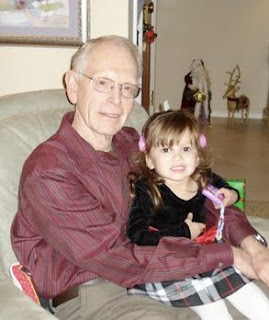My dad, Jerry, wrote to me about a conversation he had with a friend of his who is dying. Dad said that the conversation felt “unsatisfying,” that he may have made his friend feel worse. The trouble with death is we can’t fix it. I remember when the family guinea pig died. My mom and stepdad were out of town and I was taking care of my much younger half siblings. They watched as I dug a hole in the front yard to lay the little furry squealer. My sister (about age 4) was crying as I lowered it into the hole, but my brother (age 2) was angry. “Don’t put it in there. Wait until Daddy gets home. He’ll fix it!”
In my reply to my Dad, I wrote that I can't imagine what it's like to be losing a friend and trying to find the right words. But, I continued, in my minimal experience with death, it seems like people always want to find the right things to say when the best thing we can do is to listen and be present with what they are telling us. I remember when my dad’s mother, Margo (or Nonnie as we all called her), was nearing the end of her life. She said: "Everyone seems to want to tell me what I'm going through when I'm the one dying." Maybe I was afraid to hear what she'd say. Fear gets in our way. Death is a solitary, often lonely, process it seems, but we can learn from each other's experience of it. So maybe just my dad taking the time to be on the phone with his friend was enough.
When my stepdad, Phil, was facing death, deteriorating from Multisystem Atrophy (MSA), he seemed so resigned and lost in a way. One day I was sitting next to him on the bed watching TV and he said that he had dreamed he died the night before. I asked him what it was like and he said: "It wasn't so bad!" and then he laughed. I couldn’t believe we were laughing about something so grave. But, I learned that to keep our senses of humor even in the face of death is the way to go.
I am fascinated by death and how people die in peace - or not. For an assignment for my Masters in counseling program, I interviewed a chaplain at our local hospice. He said that he helps people find meaning, which helps regrets take a back seat. He said he listens to their stories and then points out how they contributed to the world and to others' lives. As a counselor, though, we primarily work with the grieving families so I’m not sure I will move in that direction. I want the chaplain's job!
One of my favorite books is A Year to Live by Stephen Levine. He says: “In whatever condition and conditioning we find ourselves, whether we have just won the lottery or discovered we have only a year to live, there is a basic, even essential, gratitude contemplation that is always appropriate…It acknowledges the enormous opportunity of being alive and awakening to our true nature.” Every page of that book is precious and I am moved no matter how many times I read it. Essentially, when loved ones around us are dying we are given, again, the gift of life and an opportunity to deepen our relationships to self and others and to appreciate this day, this moment in these dear bodies. And when it comes to their experience of transitioning from this planet, all we can do is listen and bravely follow their cues.


No comments:
Post a Comment